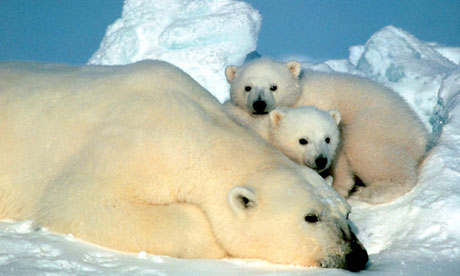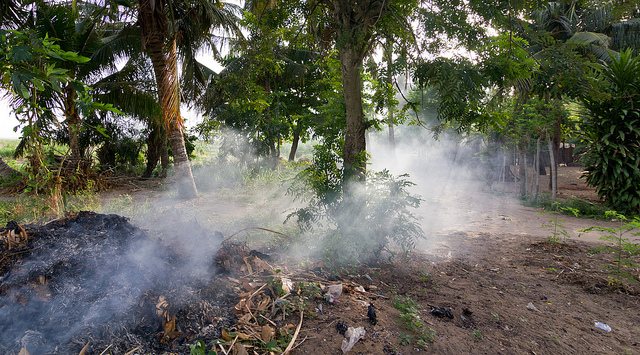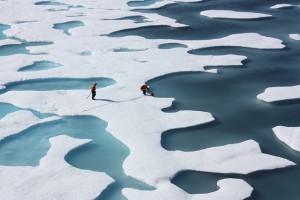Search Results for Tag: study
Pollution by burning trash – #numberoftheweek: 41
More than 40 percent of the garbage that we produce is burned unregulated, estimates a new study led by the National Centre for Atomspheric Research. These fires are responsible for blowing gases and particles into the atmosphere. You can guess that this is not exactly healthy, neither for humans nor the climate.
How did the researches manage do collect the data? They could hardly visit every open fire around the globe to measure the influence of it’s smoke.
Instead they compared population figures and per capita waste production with official tallies of trash disposal for each country in the world. The result is that 1.1 billion tons, or 41 percent, of the total waste generated worldwide is disposed of through unregulated burning every year: our #numberoftheweek.
The study also offers the opportunity to check if your country is among the biggest polluters. If you are living in China, the United States, India, Japan, Brazil, and Germany you belong to the top waste producers worldwide. But if you call China, India, Brazil, Mexico, Pakistan, and Turkey home, your nation belongs to the greatest emitters of pollution from trash burning.
Scientists more certain humans cause global warming
A much-awaited United Nations report on the science behind climate change says scientists are 95 percent sure that humans are the “dominant cause” of global warming since the 1950s. The document, which is meant to serve as a guideline for policymakers to shift towards greener energies, warns that the impact of greenhouse gas emissions could linger for centuries.
The report by the Intergovernmental Panel on Climate Change (IPCC) is considered the most comprehensive document on our understanding of the mechanics of a warming planet and the physical evidence behind it.
The following are the main findings of the report:
- Global warming is “unequivocal,” on the ground, in the air and in the oceans. And It’s “extremely likely” or 95 percent likely that human activities, led by the burning of fossil fuels, are the main cause of a rise in temperatures since the 1950s.
- Concentrations of carbon dioxide and other greenhouse gases in the atmosphere have increased to levels that are unprecedented in at least 800,000 years. The burning of fossil fuels is the main reason behind a 40 percent increase in C02 concentrations since the industrial revolution.
- Short, individual periods, such as 1998, which was an unusually warm year, are influenced by natural variability and are not an indicator of long-term climate trends.
- Global temperatures are likely to rise by 0.3 to 4.8 degrees Celsius, or 0.5-8.6 Fahrenheit, by the end of the century depending on how much governments control carbon emissions.
- Sea levels are expected to rise a further 10-32 inches (26-82 centimeters) by the end of the century. That will pose a threat to coastal cities from Shanghai to San Francisco.
- The Greenland and Antarctic ice sheets have been shrinking over the past two decades. Glaciers have continued to melt almost all over the world. Arctic sea ice has shrunk and spring snow cover has continued to decrease, and it is “very likely” that this will continue.
Wind power crucial for fighting climate change
 As the parties are battling over ways to fight climate change in Durban at COP17, the Global Wind Energy Council published a new study on the potential of wind power for significantly reduce CO2 emissions in the energy sector. Since 40% of global CO2 emissions are produced by the power sector it is perfectly clear that we can not win the fight against climate change without a dramatic shift in the way we produce and consume electricity. As science makes clear: global emissions need to peak and begin to decline before 2020. That is a goal only to be reached with a increase of in renewable energy deployments. While building a conventional power plant can take up to ten years, a large wind farm can be put up in a matter of months. And within three to six months of operations, a wind turbine has offset all emissions from its construction, to run virtually carbon free for the remainder of its 20 year lifetime, according to the study.
As the parties are battling over ways to fight climate change in Durban at COP17, the Global Wind Energy Council published a new study on the potential of wind power for significantly reduce CO2 emissions in the energy sector. Since 40% of global CO2 emissions are produced by the power sector it is perfectly clear that we can not win the fight against climate change without a dramatic shift in the way we produce and consume electricity. As science makes clear: global emissions need to peak and begin to decline before 2020. That is a goal only to be reached with a increase of in renewable energy deployments. While building a conventional power plant can take up to ten years, a large wind farm can be put up in a matter of months. And within three to six months of operations, a wind turbine has offset all emissions from its construction, to run virtually carbon free for the remainder of its 20 year lifetime, according to the study.
In the latest publication concerning “Wind Energy and climate policy” introduced here in Durban it says that in terms of the targets already stated by the industrialized countries for the period up to 2020, global wind energy could contribute at least 44% of the total emissions reductions, i.e. 1.5 billion tons of CO2 every year. And although that is nowhere near what the science tells us is required, even for a larger reduction wind power could play a crucial role in achieving that goal.
As Nelson Mandela said: “It always seems impossible, until it is done.”
It is all about climate change
GLOBAL IDEAS Reporter Manuel Özcerkes is filming in Uganda for his new report on climate education. Here he will meet the singer Angella Katatumba and a few more of the British Council Climate Champions.
In Uganda a lot of people are talking about climate change, there are campaigns to equip the people with knowledge. Even in school climate change is a major topic. But sometimes climate change is responsible for things I would never expect. The student in the clip explains that there is a flood in the UK and a man with his bicycle would eventually die in the water. And suddenly she shows the picture of a sad lady in Germany. She is not happy about the snow that is caused by the climate change. That lady with the sad face is the German Chancellor Angela Merkel. 30 Minutes later I asked her if she knows who that sad lady was? She did not. She just did researches in the Internet. Well, sometimes the world wide web is not the right source for researches about the effect of the global warming or the reason why Angela Merkel seem to be so sad, I guess.
Good news for polar bears?
 Well, yes, if a new study is to be believed… Researchers claim that the Earth's polar ice caps are not likely to melt as rapidly or irreversibly as previously thought. The polar bear can be saved from extinction – but only if action is taken quickly. Greenhouse gas emissions must be cut tremendously. The study was published in the journal Nature. Find our more about it here.
Well, yes, if a new study is to be believed… Researchers claim that the Earth's polar ice caps are not likely to melt as rapidly or irreversibly as previously thought. The polar bear can be saved from extinction – but only if action is taken quickly. Greenhouse gas emissions must be cut tremendously. The study was published in the journal Nature. Find our more about it here.





Feedback